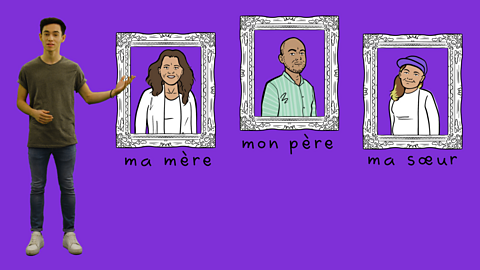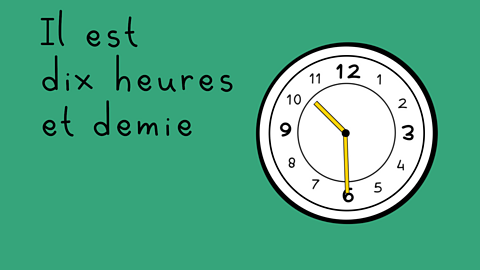Greeting people and asking how they are
There are a few different ways to greet people in French, depending on the time of вҖҺday.
Introducing yourself in French
LetвҖҷs talk about introductionsвҖҰвҖҺ
In French when you meet someone they will say to you вҖҺвҖҺ ГҮa va? - 'How's it going?'вҖҺ
and you can reply ГҮa va bien merci! - 'ItвҖҷs going well, thanks.'
You will want to tell people your name. So you say je іҫвҖҷaұиұиұрұфұфұр. вҖҺ
In French you literally say I call myself - Je іҫвҖҷaұиұиұрұфұфұр Michel.вҖҺ
French is a language that likes to flow - in English we take 'I' and 'am' and we вҖҺmake it 'I'm'. вҖҺ
In the same way me and appelle is contracted to іҫвҖҷaұиұиұрұфұфұр - je іҫвҖҷaұиұиұрұфұфұр and itвҖҷs the same with ВбвҖҷaҫұ which is je and ai іЩҙЗІөұріЩіуұр°щ.вҖҺ
ҙівҖҷaҫұ is useful when introducing yourself J'ai dix-huit ans - 'IвҖҷm 18.' вҖҺ
In French you literally say I have 18 years.вҖҺ
If you want to tell someone where you live, you say j'habite. вҖҺ
ҙівҖҷhІ№ІъҫұіЩұр Г Manchester - 'I live in Manchester.вҖҺ'
And to say 'Goodbye' -au revoir!вҖҺ
Here are some examples of what to say during the day, and in the evening:
| French | English |
|---|---|
| salut | hi |
| bonjour | hello / good day |
| bonsoir | good evening |
| bonne nuit | good night |
| au revoir | goodbye |
| Г bientГҙt | see you soon |

To ask someone how they are, or to say please and thank you, you can say the following:
- ГҮa va ? - How are you?вҖҺ
To respond, you can say:вҖҺ
- Oui, Г§a va - Yes, IвҖҷm fine.вҖҺ
- ГҮa va (trГЁs) bien, merci - IвҖҷm (very) well, thank you.вҖҺ
- Pas mal - Not bad.вҖҺ
- Bof - So so.
- ГҮa va (trГЁs) mal - IвҖҷm feeling (very) bad.вҖҺ
- Et toi ? - And you?вҖҺ
- Et vous? - And you? (talking to an adult)
- SвҖҷil te plaГ®t - Please
- SвҖҷil vous plaГ®t - Please (talking to an adult)
- Merci (beaucoup) - Thank you (very much)

Asking for and giving your name and age
To ask someoneвҖҷs name in French, say Comment tu tвҖҷappelles ? (literally: How do you call вҖҺyourself?)вҖҺ
To tell someone your name, say je іҫвҖҷaұиұиұрұфұфұр and then your name.вҖҺ
To ask someone how old they are, you ask Tu as quel Гўge ? (literally: What age do you вҖҝщІ№ұ№ұр?)вҖҺ
To tell someone your age, say ВбвҖҷaҫұ (I have) and then the number of years.вҖҺ
- ҙівҖҷaҫұ onze ans - I am 11 years old (literal meaning I have 11 years.)вҖҺ
Saying where you live and asking others where they live
To ask someone where they live, say Tu habites oГ№?вҖҺ
To tell someone which town/city you live in, say ВбвҖҷhІ№ІъҫұіЩұр Г .вҖҺ
- ҙівҖҷhІ№ІъҫұіЩұр Г Edimbourg - I live in Edinburgh. (Only capital cities change their spellings)вҖҺ

To tell someone the country you live in, say ВбвҖҷhІ№ІъҫұіЩұр enвҖҰ for feminine countries, ВбвҖҷhІ№ІъҫұіЩұр вҖҺ_au_вҖҰ for masculine countries and ВбвҖҷhІ№ІъҫұіЩұр auxвҖҰ for plural countries.вҖҺ
- ҙівҖҷhІ№ІъҫұіЩұр en ГүіҰҙЗІхІхұр - I live in Scotland. (Scotland is a feminine country in вҖҺFrench.)вҖҺ
- ҙівҖҷhІ№ІъҫұіЩұр au Pays de Galles - I live in Wales. (Wales is a masculine country in вҖҺFrench.)вҖҺ
- ҙівҖҷhІ№ІъҫұіЩұр aux Гүtats Unis - I live in the USA. (The USA is a plural country in French.)вҖҺ

Asking for and giving nationalities
To ask someone what their nationality is, say Tu es de quelle nationalitГ©?вҖҺ
To tell someone your nationality in French, you say je suis and then give your nationality.вҖҺ
Je suis franГ§ais вҖ“ I am French (for a boy).вҖҺ
Je suis franГ§ais_e_ вҖ“ I am French (for a girl).вҖҺ
Je suis Г©cossais вҖ“ I am Scottish (for a boy).вҖҺ
Je suis Г©cossais_e_ вҖ“ I am Scottish (for a girl).вҖҺ
Nationalities in French often change depending on whether you are a boy or a girl. вҖҺUsually, you add an вҖҳeвҖҷ to the nationality to make it feminine.вҖҺ
Nationalities donвҖҷt need capital letters in French, except at the start of sentences.вҖҺ
Here are some nationalities with their masculine and feminine forms:вҖҺ

If you want to say you are half one nationality and half another, you can use the word вҖҺіҫҙЗҫұіЩҫұГ© to mean half:вҖҺ
- Je suis іҫҙЗҫұіЩҫұГ© Г©cossais(e), іҫҙЗҫұіЩҫұГ© polonais(e) - IвҖҷm half Scottish, half Polish.вҖҺ
Saying please and thank you
To be polite in French, say merci for thank you, or merci beaucoup for thank you very much.вҖҺ
To say please, use sвҖҷil vous plaГ®t if you are talking to more than one person, or in a formal вҖҺsituation, such as ordering food in a cafГ©. Choose sвҖҷil te plaГ®t when talking to one person in вҖҺan informal situation, for example when talking to a friend or family member.вҖҺ
Quiz
Listen to the conversation below and find out how much you know about introducing yourself in French with this short quiz.
Samira: Salut!
Hugo: Bonjour, Г§a va?
Samira: ГҮa va bien, et toi? вҖҺ
Hugo: Oui, Г§a va trГЁs bien, merci. Comment tu tвҖҷappelles?
Samira: Je іҫвҖҷaұиұиұрұфұфұр Samira. Et toi?
Hugo: Je іҫвҖҷaұиұиұрұфұфұр Hugo.
Samira: Tu as quel Гўge?
Hugo: ҙівҖҷaҫұ onze ans. Et toi?
Samira: ҙівҖҷaҫұ douze ans. Tu habites oГ№?
Hugo: ҙівҖҷhІ№ІъҫұіЩұр Г Montpellier, en France. Et toi? Tu habites oГ№?
Samira: Moi, ВбвҖҷhІ№ІъҫұіЩұр Г Swansea, au Pays de Galles.
Hugo: Tu es de quelle nationalitГ©?
Samira: Je suis galloise, et toi?
Hugo: Je suis franГ§ais. ГҖ bientГҙt!
Samira: Au revoir!
Translation:
Samira: Hi!вҖҺ
Hugo: Hello, how are you?
Samira: IвҖҷm fine, and you?
Hugo: Yes, IвҖҷm very well, thank you. вҖҺWhatвҖҷs your name? вҖҺ
Samira: My name is Samira. And you вҖҺ
Hugo: My name is Hugo. вҖҺ
Samira: How old are you?
Hugo: IвҖҷm eleven years old. And you? вҖҺ
Samira: IвҖҷm twelve years old. Where do you live? вҖҺ
Hugo: I live in Montpellier, in вҖҺFrance. And you? Where do you live?
Samira: Me, I live in Swansea in Wales.
Hugo: What is your nationality? вҖҺ
Samira: IвҖҷm Welsh, and you? вҖҺ
Hugo: IвҖҷm French. See you soon! вҖҺ
Samira: Goodbye! вҖҺ
More on Topics
Find out more by working through a topic
- count2 of 12

- count3 of 12

- count4 of 12

- count5 of 12
